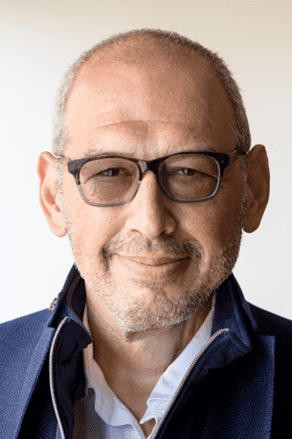Perspectives
7wireVentures Presents: Top of the Ladder Featuring Itzik Cohen, CEO of PayZen
 How does a Euro league basketball champion go on to become a three-time startup founder? For Itzik Cohen, it was a feverish passion for technology. After successfully building and scaling two Fintech companies, Itzik set his sights on solving the next complex challenge: healthcare affordability. Collaborating with his long-term co-founders Ariel Rosenthal and Tobias Mezger, Itzik and his team founded PayZen with the goal of creating a no-cost financing solution available to all patients.
How does a Euro league basketball champion go on to become a three-time startup founder? For Itzik Cohen, it was a feverish passion for technology. After successfully building and scaling two Fintech companies, Itzik set his sights on solving the next complex challenge: healthcare affordability. Collaborating with his long-term co-founders Ariel Rosenthal and Tobias Mezger, Itzik and his team founded PayZen with the goal of creating a no-cost financing solution available to all patients.
Itzik Cohen is the CEO and Co-Founder of PayZen, a healthcare affordability solution leveraging AI to create free, individualized payment options for all consumers. As a serial entrepreneur, has held several esteemed leadership roles, recently as CEO of Beyond Finance, Chief Business Officer for Prosper Marketplace, and Founder & CEO of ClipSync.
We connected with Itzik to learn more about his unique career journey, why he was motivated to build his next business in healthcare, and much more.
- As a child, what did you want to be when you grew up?
At about age 10, I wanted to be an astronaut. I was always fascinated with space and science. However, I had learned that there was a maximum height to be an astronaut. At 6’8 today, you can imagine that I was a very tall kid! In fact, I reached that maximum height when I was already 10! So, I had to change my dreams and started playing basketball at about that age. Larry Bird was my hero at the time, so I changed my vision from becoming an astronaut to becoming an NBA player. I was pretty lucky that I was able to live out part of my childhood dream. While that is a pretty broad spectrum, I think those two dreams reflect my broad interests in life.
- What was your first job?
 I would say being a professional basketball player was my first real job. I was very fortunate to be offered a professional contract when I was 17 to play for Maccabi Tel Aviv. This was technically my first paycheck.
I would say being a professional basketball player was my first real job. I was very fortunate to be offered a professional contract when I was 17 to play for Maccabi Tel Aviv. This was technically my first paycheck.
As a professional athlete, we do practice and travel quite a bit, but it is also a very convenient way to study. With two practices a day, each at three hours, there is a lot of free time. If you’re focusing on the right things, which I did, you can learn a lot! I had a passion for technology. The common knowledge among my coaches and my teammates was that if I really liked basketball as much as I liked technology, I could have been in the NBA! Now, I’m doing what I really like, and basketball was a good foundation for what would become the next chapter of my career.
I went to university for computer science and math. But my real programming techniques were self-taught and through peer groups. I then went on to take positions at NetManage, and WebEx where I had my “basic” training before founding my first business.
“The common knowledge among my coaches and my teammates was that if I really liked basketball as much as I liked technology, I could have been in the NBA!”
- So, you started off your career as a professional basketball player playing for Maccabi Tel-Aviv, a 5-time EuroLeague champion! What lessons have you applied from your professional basketball career to leading teams at high-growth start-ups?
 My leadership style has been influenced by basketball. I believe that professional athletes in team sports make really good executives. In basketball, you have to play as a team and everybody is dependent on each other. If you’re a point guard or a shooting guard, you’re never going to get picks or screens from the big guys. If you’re a big defensive player, you’re never going to get passes and, if you do the right thing, you’re never going to score. However, scoring is what gets you the big contracts! For each player, it’s a balance, but ultimately the successful ones find a way to do well by also helping the team do well.
My leadership style has been influenced by basketball. I believe that professional athletes in team sports make really good executives. In basketball, you have to play as a team and everybody is dependent on each other. If you’re a point guard or a shooting guard, you’re never going to get picks or screens from the big guys. If you’re a big defensive player, you’re never going to get passes and, if you do the right thing, you’re never going to score. However, scoring is what gets you the big contracts! For each player, it’s a balance, but ultimately the successful ones find a way to do well by also helping the team do well.
A corporation is a team sport as well. I cannot build my company without my team, and they cannot do their job without me. Being the coach or a captain of the team is like being a CEO. It’s your job to focus on each player while also determining how you can get the most from your broader team. Like a coach, you need to have a pretty big and deep bench as your strategy changes. You also may get a new player or trade a player. This is similar to evolving your team as the needs of the company change. Many times, you have to think on your feet and make real-time decisions. I still apply many of the lessons that I observed from my coach and from my time in basketball to how I lead today.
- As a three-time founding CEO of Fintech companies, we are so pleased that you are leveraging your expertise to now build a business in healthcare. What inspired you to start your next company in this industry?
There are two main reasons we started PayZen. The first is the opportunity and the size of the problem. The second is that we (the founding team) believed that we were the people that could actually solve the problem. For the first piece, we asked ourselves is this a big enough and an important enough problem to tackle? Given that there is $250B of medical debt in the US and 50% of patients can’t afford to pay a $400 medical bill, the answer is undeniable: yes. My co-founders and I felt like our relevant experiences and our tenacity would allow us to push through the inevitable challenges and solve this problem.
There are new challenges and obstacles that we are solving every day. However, the one that surprised me the most about our business is that we actually didn’t understand how large the problem was. When we started the business, we thought we were solving the issues of patient finance. Our goal was to do a better job than the financing players that existed. But when we were actually in the trenches, we very quickly realized that problem is not just a finance problem, it’s an affordability problem. This transcends many different use cases that we did not initially consider because affordability in healthcare is highly complex. Some people don’t go to the doctor because they don’t think they could afford their care. We then had to ask ourselves, how do you reach these people? How can we let them know they can actually afford healthcare and encourage them to go? This broader challenge – affordability and accessing healthcare – is what is driving us to create a solution that will be applied at many different times in the care cycle. It’s been a journey building in a complex industry like healthcare and we’re learning all the time.
- You’ve discussed how PayZen’s north star is the capacity to provide affordable healthcare to all patients – with financing products that have no interest charge and no fees. Can you discuss how PayZen is transforming healthcare affordability and leveraging technology to successfully execute this goal?
Our thesis was that we think that most people are decent and want to pay their medical bills. If you make it easier for people to afford something, they will pay because they want to pay their doctors. Oftentimes, however, patients have debt payments so high that they cannot. Paying $2,000 over 12 months is not accessible to a lot of people. So, instead of approving people as you would in a traditional Fintech company, we create an experience to ensure that patients are enrolling in a payment plan that will suit their needs and one they can actually afford.
So how do we put you in a plan that actually fits your financial ability? Well, we allow everybody to participate in our platform. We also give the provider an option: you can finance the payment plans, or you can keep them on your books. Leveraging our technology platform, we have the ability to price the risk of each individual accordingly and more accurately. Likewise, we can also accelerate payment to the provider, if that is their choice. We’re fine not financing the provider’s full debt portfolio if this is their preference. This is why we don’t like to be called a patient financing company: because many times we don’t actually finance care! This value proposition resonates with providers like we have never seen before. Providers finally feel like there is a platform that is a fair arbiter between patients and healthcare organizations.
As a result, we believe our solution is driving a double positive— meaning more payments to providers and better health outcomes for consumers — because people will actually be less afraid to go to the doctor because of costs.
- As you mentioned, PayZen is focused on delivering tremendous value to providers by taking the financial burden off of institutions through a flexible, non-recourse solution – accelerated most recently through some exciting strategic partnerships with Flywire and Epic! Can you talk more about these partnerships and what it means for expanding patient access to affordable care?


The technology we created is a platform at its core. We realized early on that PayZen would not be a solution that focuses deeply on one path to market, but needs to be everywhere, both across multiple use cases and in different situations. We also realized that there are already players who are doing a good job modernizing patient financial engagement, for example. Our thought was, let’s make the experience as integrated as we can for providers.
As someone who was what I will call a “Fintech 1.0 veteran”, I built a business in a world where FinTech was all about unbundling the bank. We were focused on all the various aspects of a bank— wealth management, lending, credit cards— and making the experience much better by applying different technologies. Now FinTech 2.0 is more about integration. How do we integrate all of these improved services and create one seamless, unified experience while still capturing all of the value from technology?
We’re applying this same thought process in healthcare. If a patient already has a good experience with how she/he is engaging with the health system, don’t change their experience. PayZen can work in the background through partnership integration. We are very fortunate that this approach resonated with a lot of different players in the industry. Flywire was the first partner that signed with us and based on the response of their biggest customers, it resonates! This is also the reason we have an Epic MyChart application. Our focus is on being the infrastructure that provides affordability rather than focusing on one product. The platform is going to enable the APIs and the products to ride on top of it. Partners across the ecosystem will benefit from our AI-enabled underwriting, financing, or servicing, which is easily integrated with somebody else’s solution. We are very excited about this approach!
- We’re so excited to have been a part of PayZen’s Series A financing earlier last year! Can you share what excites you about the future of the company and what we can expect in the next year?
Our goal this year is to address more use cases, expand the product to address broader health situations, and provide more affordability options in care.
Today, we’re in hypergrowth mode. In fact, we’re currently experiencing an average of 100% month-over-month growth for the 10th month in a row! It’s pretty amazing to see the machine that we have created from ground zero. At the beginning of the year, we added several logos and were focused on implementing with these new customers. Now, this machine is getting very efficient. Our partnerships that I mentioned are also contributing to a significant part of this growth. We are excited about some new partnerships that we have secured and will announce later this year!
We are also obsessively looking at the product and thinking about how PayZen can be applied in more use cases, and encourage people to engage in additional healthcare services that they need. Just based on usage patterns, we thought about what else people may need from an affordability perspective. The next expansion of the product will address these needs. However, the platform itself and our core elements—data-driven underwriting and pricing, financing, and servicing— will remain the same regardless of the next new use case. We will also continue to analyze our data and come up with new and exciting solutions to offer providers and patients down the road.
- What’s your superpower?
 The ability to translate the abstract into the tangible.
The ability to translate the abstract into the tangible.
There are many entrepreneurs that are good at creating ideas. But often times an idea is just that— a thought in your head. In my past companies, I’ve been able to leverage my creativity and turn it into an actual functioning business. If I look at PayZen today, we were just an idea three years ago and now, we are now a successful business making a difference in the lives of so many.
- What is one thing you wish you could tell your former self before starting a company?
Pick the right partners. When I started PayZen, I knew that I wanted to build a business with Tobias and Ariel. Not only did I know they were highly qualified and the right individuals to lead this business, but I also trusted them. You can certainly build a successful company without the perfect partners, but having the right people— whether it’s your co-founders, your investors, or your commercial partners— will provide you with the right foundation to optimize your chances of success.
- What is one piece of advice you’d offer to other digital health entrepreneurs?
One of the best value propositions of building a business in healthcare is that the company and the people are mission-driven. When we hire at PayZen, we are meticulous about ensuring that the people we hire are aligned with the mission. We confirm, then re-confirm, and re-confirm again that people want to join our company because they deeply care about creating a more affordable healthcare system. We know that everyone on our team knows that the number one priority is doing the right thing for the patient and the provider because those are the two stakeholders that need the most help. At the end of the day, if we know we are making decisions with that prioritization in mind, everyone on our team will usually make the right choice.
Mission-driven team members are going to be the ones who stick with your company through the good moments and the inevitable challenging ones. Mission alignment is one of the best motivators for building and scaling the right team. Healthcare entrepreneurs should be mindful about ensuring that mission alignment is present in each of their individual hires. That is the best way to ensure that it penetrates throughout your organization.